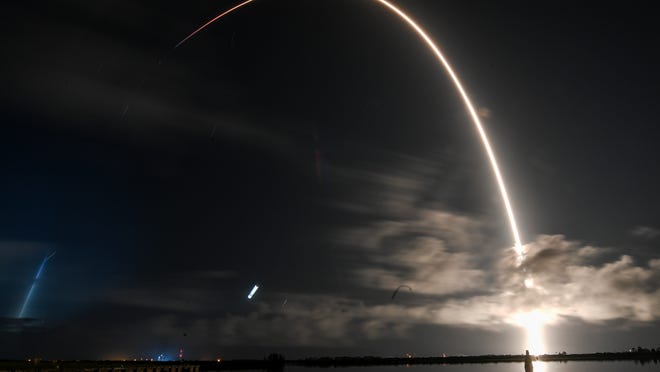SpaceX’s Falcon 9 rocket fleet has been grounded by the Federal Aviation Administration after an upper stage failure occurred during Thursday’s launch from California, sending its Starlink satellites into an eccentric orbit.
FAA landing ban has immediate impact on Space Coast launch schedules This year, it’s growing at a record pace. Of the 50 missions planned for 2024, 46 will be launched by Falcon 9. From Cape Canaveral Space Station and the adjacent NASA Kennedy Space Center.
“The investigation is intended to further public safety, determine the root cause of the accident and identify corrective actions to prevent a recurrence,” the FAA said in a statement on Friday.
“Return to flight will be permitted only if the FAA determines that any systems, processes or procedures related to the accident do not affect public safety. Additionally, SpaceX may need to apply for and receive approval from the FAA for an amendment to its license to incorporate the corrective actions and satisfy all other licensing requirements,” the statement said.
Falcon 9:SpaceX on Monday marked the Space Coast’s 50th launch of 2024 with the Turksat 6A satellite mission.
In the short term, Brevard County may see the following postponed indefinitely due to the suspension of the Falcon 9 program:
- The Starlink 10-4 mission was scheduled to lift off before dawn from the Cape Canaveral Space Force station early Sunday morning.
- Another early morning Starlink mission is scheduled for Wednesday.
- Polaris Dawn Mission Commander Jared Isaacmanwill send four private citizens into orbit for the first-ever commercial spacewalk. The high-profile launch had been scheduled for July 31 at the earliest.
Thursday’s ill-fated Falcon 9 mission took off from Vandenberg Space Center carrying 20 Starlink satellites. A statement on SpaceX’s website reads:Company officials said the upper stage had a liquid oxygen leak and the satellite was deployed only 84 miles (135 kilometers) above Earth — less than half the expected perigee altitude.
The statement said the satellites would “completely disappear” upon re-entering Earth’s atmosphere and “pose no threat to other satellites in orbit or to public safety.”
“This incident is a reminder of how technically challenging spaceflight is. To date, we have completed 364 successful Falcon launches, safely putting astronauts, customer payloads and thousands of Starlink satellites into orbit, making the Falcon rocket family one of the most reliable rockets in the world,” a SpaceX statement said.
“SpaceX will work with the FAA to conduct a thorough investigation to determine the root cause and take corrective actions to ensure the success of future missions,” the statement said.
“With strong satellite and rocket production capabilities and high launch frequency, the company is well positioned to recover quickly and maintain its pace as the world’s most active launch services provider,” the statement said.
Major SpaceX accidents are rare in Florida. In June 2015, The Falcon 9 broke apart 2 minutes and 19 seconds after launch. It launched from what was then Cape Canaveral Air Force Station. The rocket was carrying a SpaceX Dragon capsule carrying more than 5,000 pounds of supplies bound for the International Space Station. Engineers said it was a broken support strut that caused the oxygen tank explosion..
And in September 2016, Falcon 9 explodes spectacularly on the launch pad during a refueling test. An explosion occurred at an air force base, destroying a $200 million communications satellite. Changes in helium filling operations.
Isaacman previously funded Inspiration 4, the first fully private orbital space mission, which launched aboard a Falcon 9 from Kennedy Space Center in September 2021. In a tweet on Friday, he praised SpaceX’s “great track record” with its workhorse rocket.
“Speaking from personal experience, they are extremely transparent when there are issues. I have no doubt they will quickly determine the cause and ensure the most cost-effective, reliable launch vehicles keep payloads in orbit,” Isaacman tweeted.
“With regards to Polaris Dawn, it will fly whenever SpaceX is ready and we have full confidence in the rocket, the spacecraft and the operation,” he said.
Besides the 46 Falcon 9 missions, only four orbital rockets have launched from the Space Coast this year.
In light of Friday’s FAA decision, the next rocket officially scheduled for the Space Coast calendar is the ULA Atlas V rocket USSF-51, which will launch on a Space Force national security mission on July 30. The rocket will launch from Launch Complex 41 at Cape Canaveral Space Force Station.
For the latest news from Cape Canaveral Space Station and NASA’s Kennedy Space Center, floridatoday.com/Space.
Rick Neal Neil is a space reporter for Florida Today. Contact Neil atcontact addressTwitter/X: Rick Neal 1


